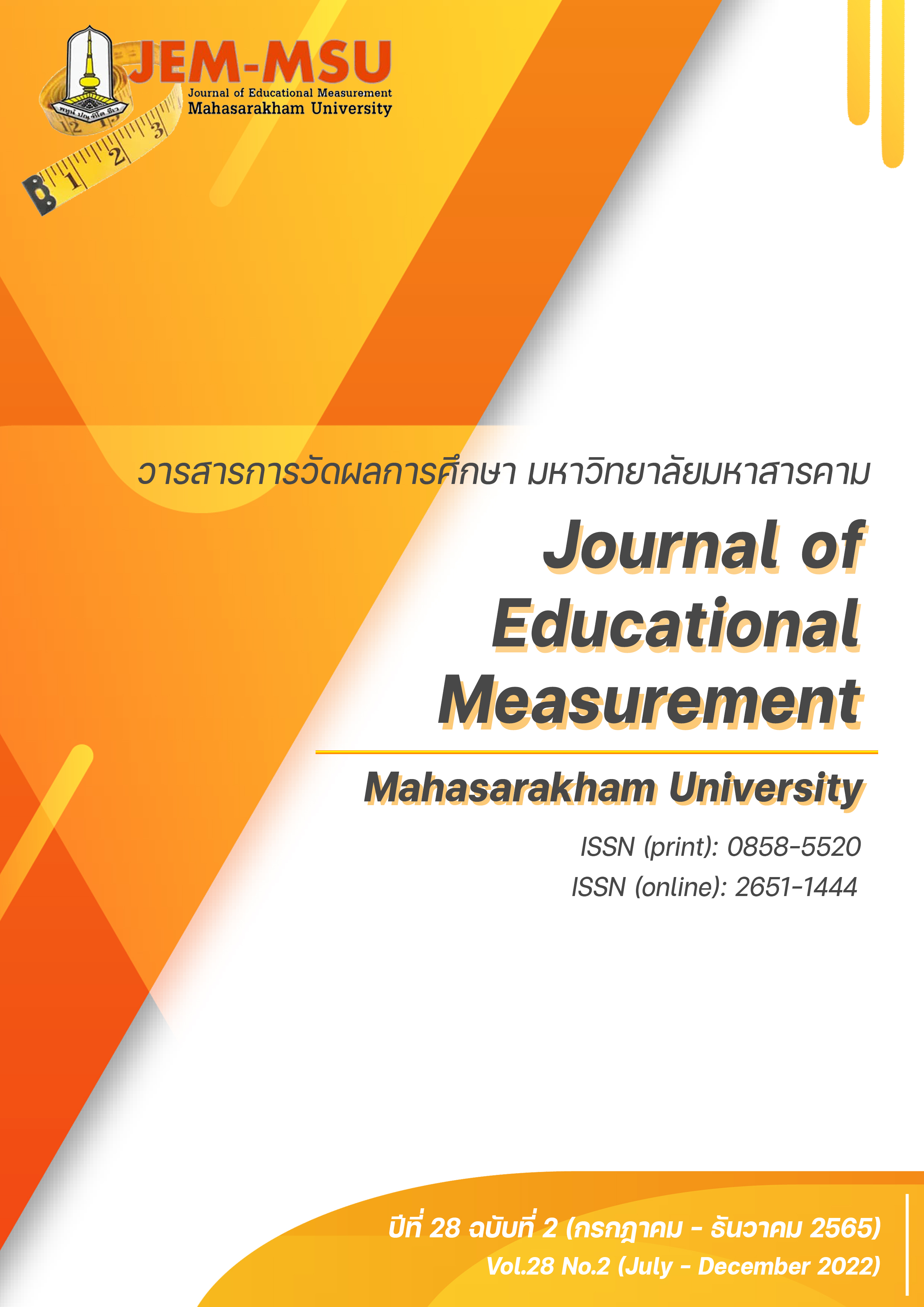A Model of Teamwork Culture Development for the Sub-District Quality Schools under the Office of Udon Thani Primary Education Service Area 3
Main Article Content
Abstract
The objectives of this research were: 1) to study the components and indicators of the teamwork culture development for the Sub-District Quality Schools; 2) to verify the consistency of the teamwork culture indicator model with the empirical data; 3) to propose a model of teamwork culture development for the Sub-District Quality Schools under the Office of Udon Thani Primary Education Service Area 3. The sample consisted of 240 administrators and teachers in the Sub-District Quality Schools under the Office of Udon Thani Primary Education Service Area 3, obtained by multistage random sampling. The research instrument was a 5-point rating scale questionnaire with validity between 0.80-1.00 and reliability of 0.959. The analysis of data employed descriptive statistics and confirmatory factor analysis of a computer package. The results of the research were as follows: 1) the teamwork culture for the Sub-District Quality Schools, which had 4 components: (1) beliefs and shared values, having 3 indicators; (2) team norm, having 3 indicators; (3) collaborative action, having 3 indicators, and (4) team leadership, having 3 indicators. 2) The results of the analysis of the teamwork culture indicator model developed by the author revealed that the model was consistent with the empirical data. 3) The Model of Teamwork Culture Development for the Sub-District Quality Schools under the Office of Udon Thani Primary Education Service Area 3 was composed of 1) name, 2) principles and concepts, 3) objectives, 4) goals for success and 5) a driving mechanism for success.
Article Details

This work is licensed under a Creative Commons Attribution-NonCommercial-NoDerivatives 4.0 International License.
The content and information contained in the published article in the Journal of Educational Measurement Mahasarakham University represent the opinions and responsibilities of the authors directly. The editorial board of the journal is not necessarily in agreement with or responsible for any of the content.
The articles, data, content, images, etc. that have been published in the Journal of Educational Measurement Mahasarakham University are copyrighted by the journal. If any individual or organization wishes to reproduce or perform any actions involving the entirety or any part of the content, they must obtain written permission from the Journal of Educational Measurement Mahasarakham University.
References
Cronbach, L.J. (1970). Essentials of psychological testing. Harper and Row.
Daft, R. L. (1999). Leadership: Theory and Practice. The Dryden Press.
Deshpande, R. and Webster, F. E. (1989). Organizational culture and marketing: Defining the research agenda. Journal of Marketing, 53(1), 3-15.
Dubey, A. (2016). Indicator for Team Success. https://th.hrnote.asia/orgdevelopment/190703-psychological-safety/
Earley, P. C., & Mosakowski, E. (2000). Creating hybrid team cultures: An empirical test of transnational team functioning. Academy of Management Journal. 43(1), 26-49.
Hair, J.F., Black, W.C., Babin, B.J., & Anderson, R.E. (2010). Multivariate Data Analysis (7th ed.). Prentice Hall.
Harrison, D., Price, K., & Bell, M. (1998). Beyond Relational Demography: Time and the Effects of Surface and Deep-Level Diversity on Work Group Cohesion. Academy of Management Journal. 41(1), 96-107.
Joint Committee. (1994). The program evaluation standards: How to assess evaluations of educational programs. SAGE Publication.
Keeves, J.P. (1997). Models and model building (2nd ed.). Peraman Press.
Molose, T. (2015). Knowledge sharing, team culture, and service innovation in the hospitality sector: the case of South Africa. African Journal of Hospitality, Tourism and Leisure, 4(1), 1-16.
Shin, Y., Kim, M., Choi, J.N. and Lee, S.H. (2016). Does team culture matter? Roles of team culture and collective regulatory focus in team task and creative performance. Group & Organization Management, 41(2), 232-265.
Arthapit, A. (2018). The Influence of Proactive Personality, Organizational Culture and Work Engagement on Job Performance of Generation-Y Operational Employees at Automobile Parts Manufacturing Company. Silpakorn University Journal, 38(5), 59-79. (in Thai).
Kongsab, W. (2018). Organizational Culture, Organizational Support, Workengagement and Organizational Citizenship Behavior of Generation Y’s Operational Employees of The Bank. Srinakharinwirot Research and Development (Journal of Humanities and Social Sciences), 10(19), 171-187. (in Thai)
Kotiram, C. (2012). “21st century Factors of production that challenge Thailand's stride to adjust”. Siamturakij. 10th August 2012. (in Thai)
Lepon, W. (2017). Strategic Management Effectiveness of Outstanding District Schools Under office of Khon Kaen Primary Educational Service Area 1. Journal of Education Khon Kaen University (Graduate Studies Research), 11(1), 165-174. (in Thai)
Matsudaira, K. (2019). How to Create a Great Team Culture (and Why It Matters). Acmqueue, 17(1), 4-9. (in Thai)
Muangpoom, S. (2014). Determination and impartation of shared values of Raimai Sub-District Municipality [Master’s thesis]. Khon Kaen University. (in Thai)
Office of the Basic Education Commission. (2018). Sub-District Quality School. http://1tambon1school.go.th/ (in Thai)
Phaoat, L. (2017). Team Working of Teachers in Muang Trat explanding Opportunity schools Under Trat Primary Education Service Areas Office [Master’s thesis]. Burapha University. (in Thai)
Ratchagit, T. (2019). Build a team with potential for effective teamwork. https://th.hrnote.asia/orgdevelopment/190509-team-work/ (in Thai)
Runcharoen, T. (2010). Professionalism in Organizing and Administering Education: Education Reform Era (4th ed.). L.T. Press. (in Thai)
Srisa-ard, B. (2002). Introduction of Research (7th ed.). Suweeriyasan. (in Thai)
Thaymatr, B. (2017). Human relationships. Journal of MCU Social Science Review, 6(2), 353-368. (in Thai)
Wiratchai, N. (August 29, 2008). Development of Indicators. Ambassador Hotel. (in Thai)
Wiriyaphiphat, N. (2014). Sufficiency economy and creation of shared values in an organization. University of the Thai Chamber of Commerce Journal Humanities and Social Sciences, 34(3), 160-175. (in Thai)


